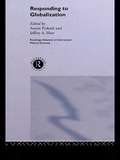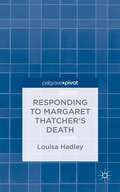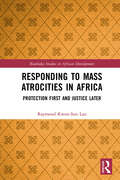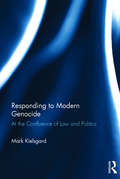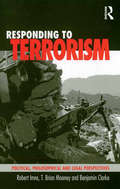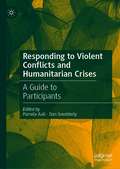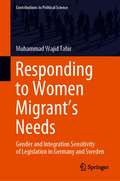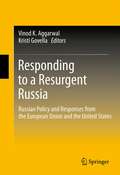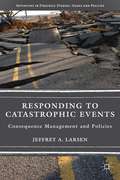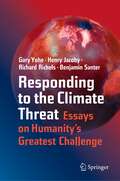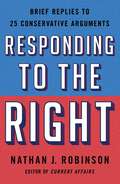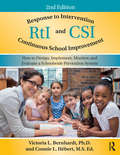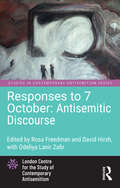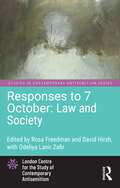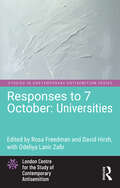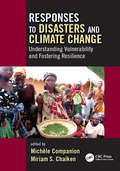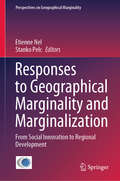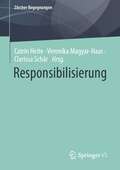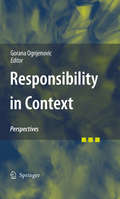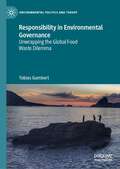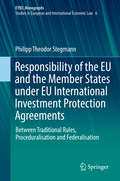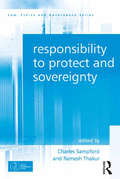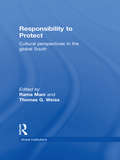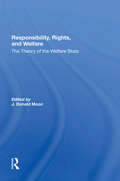- Table View
- List View
Responding to Globalisation (Routledge Advances in International Political Economy #Vol. 4)
by Aseem Prakash Jeffrey A. HartThis rigorous survey and companion volume to Coping with Globalization, focuses on the political, ideological and economic factors lying behind responses to globalization. A panel of international experts examine subjects which include; * The international monetary system after the Euro * The response of the Japanese software industry to globalization * The dynamics of globalization strategy in South Korea * Australian integration into the global economy * The impact on China and Russia in their moves toward a market economy
Responding to Margaret Thatcher’s Death
by Louisa HadleyLouisa Hadley examines the range of responses to Margaret Thatcher's death in relation to the cultural discourses surrounding Thatcher in the 1980s and since her resignation. The responses examined include the anticipation of Thatcher's death in anti-Thatcher songs, social media responses, obituaries, picture tributes and the ceremonial funeral.
Responding to Mass Atrocities in Africa: Protection First and Justice Later (Routledge Studies in African Development)
by Raymond Kwun-Sun LauThis book explores the relationship between the Responsibility to Protect (R2P) and the International Criminal Court (ICC), challenging the assumption that they are always mutually reinforcing or complementary, and examining instead the many tensions which arise between the immediate imperative of saving lives, and the more long-term prospect of punishing perpetrators and preventing future conflicts through deterrence. Around the world, audiences in the mid-1990s watched the mass atrocities unfolding in Rwanda and Srebrenica in horror and disbelief. Emerging from these disasters came an international commitment to safeguard and protect vulnerable communities, as laid out in the R2P principle, and an international responsibility to punish perpetrators, with the establishment of the ICC. The book provides context-independent proposals for resolving contradictions between the two principles, suggesting that focusing on timing and sequencing in invoking international R2P and ICC actions could facilitate the easing of tensions. Drawing on examples from Uganda, Kenya, and Darfur, the book applies International Relations concepts and theories in order to deepen our understanding of international responses to mass atrocities. Ultimately the book concludes that a 'Protection First, Justice Later' sequence approach is necessary for managing the tension and facilitating more effective and consistent international responses. This book makes an important contribution to discussions and debates surrounding international responses to genocide and mass atrocities. It will be of special interest to scholars, students and policymakers in International Relations, Global Governance, African Studies, International Development, Human Rights and International Criminal Law.
Responding to Modern Genocide: At the Confluence of Law and Politics
by Mark D. KielsgardDevelopments in the understanding and treatment of genocide through the twentieth century have involved a combination of politics, public opinion, social trends, and economic development, and led to the substantive law of genocide and the assumption of international jurisdiction. This book analyzes incidences of genocide and mass atrocities, focusing on the political factors involved in modern counter-genocide efforts. Drawing on incidences of genocide and mass atrocity such as the Holocaust, the Rwandan genocide, and the Armenian genocide, Mark Kielsgard adopts a conceptual model that reveals the political factors which impact the international law of genocide, such as barriers and catalysts to transitional justice and the politics of genocide denial. As a work which provides a focused picture of those influences and their significance to genocide studies, this book will be of great use and interest to students and researchers in international criminal law, conflict studies, and conflict resolution.
Responding to Terrorism: Political, Philosophical and Legal Perspectives
by Robert Imre T. Brian MooneyTerrorism and political violence as a field is growing and expanding. This volume provides a cross-disciplinary analysis - political, philosophical and legal - in a single text and will appeal to readers interested in studying this phenomenon from all perspectives. The volume covers the full spectrum of issues, including torture, terrorism causes and cures, legal issues, globalization and counter-terrorism. The authors bring their individual specialities to the fore in a concise and easy to follow format. Comprehensive and well informed, Responding to Terrorism will appeal to a variety of disciplines including sociology, politics, security studies, philosophy, international law and religious studies. The originality of the volume makes it a valuable addition to any college or university library and classroom.
Responding to Violent Conflicts and Humanitarian Crises: A Guide to Participants
by Pamela Aall Dan SnodderlyThis book introduces the four principal sets of institutions that engage in bringing peace and relief to societies mired in violent conflicts and humanitarian crises—the United Nations and other international bodies; non-governmental organizations; civilian government agencies; and militaries. Because these institutions have distinct goals as well as overlapping mandates and activities on the ground, they do not always collaborate effectively, due in part to a lack of familiarity with how the other institutions are organized, make decisions or act on the ground. Despite declining public support for large-scale, state-building missions recently, more complex interagency efforts have evolved in partnership with host country governments. Numerous third parties continue to undertake peacebuilding, stabilization, and humanitarian relief measures around the globe. This book is intended primarily for those serving in the field, but it is also helpful to headquarters personnel and policymakers, as well as military and agency trainees and university students.
Responding to Women Migrant's Needs: Gender and Integration Sensitivity of Legislation in Germany and Sweden (Contributions to Political Science)
by Muhammad Wajid TahirThis book examines gender- and integration-specific needs of women migrants by using a unique analytic framework, covering both qualitative and quantitative methods and techniques. Case studies from Sweden and Germany are presented, investigating how the gender and integration-neutral or integration-blind nature of the reviewed legislation can disadvantage migrant women in the labor market.The book contributes to the discourses of liberal and post-colonial feminism through new methodological and empirical insights. It, therefore, is a must-read for everybody interested in a better understanding of migrant women’s chances to enter the labor market, as well as gender and integration studies in general.
Responding to a Resurgent Russia
by Vinod K. Aggarwal Kristi GovellaIn this volume, a set of issue and country experts tackle the questions surrounding the challenges of a resurgent Russia for the world order as well as for relations between the European Union and the United States. Following a brief introduction laying out the circumstances of Russia's rise, the book proceeds in three sections. In the first, Russian scholars tackle the topic of how a newly resurgent Russia sees the world. The second section examines Russia's role in the contemporary global political economy in terms of trade and financial flows and nuclear energy. The third section looks at American and European responses to Russia, and the conclusion draws together the findings from each of the chapters and presents some broad propositions regarding Russia's rise and the challenges that it presents for the US, EU and the international order in the years to come. The implications of this collection are very broad and far-reaching, with ramifications for each of the players involved as well as for the development and refinement of general international relations theories concerning global conflict and cooperation, making the book relevant for both policy-makers and scholars of international relations, Russian studies, and international political economy.
Responding to catastrophic events
by Jeffrey A. LarsenAn introduction to the range of potential disaster scenarios, covering the issues and organizational relationships of importance to the student of consequence management. These include the roles, responsibilities, and coordination requirements of first responders, the Department of Homeland Security, the Department of Defense, and the military.
Responding to the Climate Threat: Essays on Humanity’s Greatest Challenge
by Henry Jacoby Gary Yohe Richard Richels Benjamin SanterThis book demonstrates how robust and evolving science can be relevant to public discourse about climate policy. Fighting climate change is the ultimate societal challenge, and the difficulty is not just in the wrenching adjustments required to cut greenhouse emissions and to respond to change already under way. A second and equally important difficulty is ensuring widespread public understanding of the natural and social science. This understanding is essential for an effective risk management strategy at a planetary scale. The scientific, economic, and policy aspects of climate change are already a challenge to communicate, without factoring in the distractions and deflections from organized programs of misinformation and denial. Here, four scholars, each with decades of research on the climate threat, take on the task of explaining our current understanding of the climate threat and what can be done about it, in lay language—importantly, without losing critical aspects of the natural and social science. In a series of essays, published during the 2020 presidential election, the COVID pandemic, and through the fall of 2021, they explain the essential components of the challenge, countering the forces of distrust of the science and opposition to a vigorous national response. Each of the essays provides an opportunity to learn about a particular aspect of climate science and policy within the complex context of current events. The overall volume is more than the sum of its individual articles. Proceeding each essay is an explanation of the context in which it was written, followed by observation of what has happened since its first publication. In addition to its discussion of topical issues in modern climate science, the book also explores science communication to a broad audience. Its authors are not only scientists – they are also teachers, using current events to teach when people are listening. For preserving Earth’s planetary life support system, science and teaching are essential. Advancing both is an unending task.
Responding to the Right: Brief Replies to 25 Conservative Arguments
by Nathan J. RobinsonThe editor of Current Affairs artfully and efficiently debunks a series of common right-wing arguments.Are taxes theft? Is abortion murder? Does regulation destroy jobs? Is white privilege a lie? Conservative talking points are everywhere, and through well-funded media like Fox News, Breitbart, and YouTube’s "Prager University," the right has an impressive record of packaging its views for a general audience. Clearly, the left needs to do a better job of fighting back.Luckily, Current Affairs editor Nathan J. Robinson has developed a reputation as a meticulous slayer of irrational and bigoted arguments. He has tangled with the likes of Ben Shapiro, Jordan Peterson, and Charles Murray, exposing their flimsy logic and distorted facts with forensic thoroughness and savage wit. In Responding to the Right, Robinson blasts right-wing nonsense with devastating intellectual weaponry, revealing how everyone from Ann Coulter to the National Review uses fear and lies to manipulate the public. He gives a detailed explanation of how conservative arguments work and why we need to resist them, then goes through twenty-five separate talking points, showing precisely why each one fails.This essential handbook is a stimulating source of issues to debate and a comprehensive challenge to dozens of dominant orthodoxies. It sets a new standard for leftist critique, and would be an invaluable addition to the arsenals of the millions of progressives fighting the political battles of our age.
Response to Intervention and Continuous School Improvement: How to Design, Implement, Monitor, and Evaluate a Schoolwide Prevention System
by Victoria L. Bernhardt Connie L. HébertExperts Bernhardt and Hébert's latest book demonstrates strategies to ensure your entire staff works together to design, implement, monitor, and evaluate a schoolwide prevention system with integrity and fidelity. Each step in this important resource is designed to help administrators, teachers, and other educators improve the learning of every student by implementing Response to Intervention (RtI) as part of a continuous school improvement process. This second edition spotlights the "Five Stages of RtI Implementation" and is complemented by the robust online RtI Implementation Guide, which includes more than 30 downloadable templates, examples, and other files to help schools start their journey of establishing a successful system. By applying the authors' insightful guidance in Response to Intervention (RtI) and Continuous School Improvement (CSI), you'll be able to redesign your general and special education programs to put your school on a path toward improvement!
Responses to 7 October: Antisemitic Discourse (Studies in Contemporary Antisemitism)
by David Hirsh Rosa Freedman Odeliya Lanir ZafirOne of three volumes responding to the 7 October attack, Antisemitic Discourse focuses on the ideology that motivated it and the antisemitism that shaped many responses to it.It examines the provenance of the Jew-hatred, from English history to Palestinian Islamism; from toxic 19th century ‘Jewish Question’ rhetoric to the perversion of the Trotskyist tradition that allowed parts of the left to embrace antisemitism. It includes Howard Jacobson’s lecture of 22 October on antisemitism and it focuses on what was significant about this attack. There is discussion from Britain, Germany, Poland, and Norway, and a linguistic account of responses.This work will appeal to scholars, students and activists with an interest in antisemitism, Jewish studies and the politics of Israel.
Responses to 7 October: Law and Society (Studies in Contemporary Antisemitism)
by David Hirsh Rosa Freedman Odeliya Lanir ZafirOne of three volumes responding to the 7 October attack, Law and Society begins with a legal and a genocide studies critique of the claim that Israel is genocidal; another reflects on the absence of an understanding of antisemitism in international legal discourse.There are reflections on experiences in the Palestine solidarity movement and on the twists that discourse there takes. Contributions draw on Judaism, feminism, and sociology to face what happened and to trace how Israelis were transported back to a quintessentially pre-Israel Jewish experience. Others survey reports of antisemitism around the globe in the wake of 7 October, including pieces about Britain and Germany.This work will appeal to scholars, students, and activists with an interest in antisemitism, Jewish studies, and the politics of Israel.
Responses to 7 October: Universities (Studies in Contemporary Antisemitism)
by David Hirsh Rosa Freedman Odeliya Lanir ZafirOne of three volumes responding to the 7 October attack, Universities focuses on the heartland of contemporary antisemitic thinking, which is scholarship; and its reflection in student discourse on campus.Contributions go back to Sartre and to debates of Marx’s time; another looks at the New Left forged in the civil rights movement, and shows how antisemitic responses to the 2023 violence were anticipated by some of the responses to the 1967 Arab League aggression. The feminist movement and ‘progressives’ more generally come under scrutiny, and there is analysis of antisemitism on campus after 7 October, showing how it is tolerated and protected there; including in archaeological attempts to deny that there is an ancient Jewish history in Israel.This work will appeal to scholars, students and activists with an interest in antisemitism, Jewish studies and the politics of Israel.
Responses to Disasters and Climate Change: Understanding Vulnerability and Fostering Resilience
by Michèle Companion and Miriam S. ChaikenAs the global climate shifts, communities are faced with a myriad of mitigation and adaptation challenges. These highlight the political, cultural, economic, social, and physical vulnerability of social groups, communities, families, and individuals. They also foster resilience and creative responses. Research in hazard management, humanitarian response, food security programming, and other areas seeks to identify and understand factors that create vulnerability and strategies that enhance resilience at all levels of social organization. This book uses case studies from around the globe to demonstrate ways that communities have fostered resilience to mitigate the impacts of climate change.
Responses to Geographical Marginality and Marginalization: From Social Innovation to Regional Development (Perspectives on Geographical Marginality #5)
by Etienne Nel Stanko PelcThis book examines regional responses to marginality by highlighting social innovation, local capacity and new path formations in what are often seen as economically weak regions where policy and institutional considerations play a key role. Divided into three parts, it covers a wide range of topics related to geographical marginality from various angles, on both regional and local scales. The first part focuses on the role of social innovation and illustrates the themes of social innovation and new localism, local revitalization and social entrepreneurship. The second part then addresses the issues of economic responses, valorization, resource use and local action in response to marginalization. Lastly, the third part explores various policies and measures taken to respond to marginality and intensify regional development in marginal areas.
Responsibilisierung (Zürcher Begegnungen)
by Clarissa Schär Veronika Magyar-Haas Catrin HeiteDer Band prüft den Begriff Responsibilisierung aus unterschiedlichen disziplinären Perspektiven auf seine Aktualität, sein analytisches Gewicht und seine theoretischen Bedeutungen und bringt so die Erziehungswissenschaft mit der Soziologie, der Philosophie oder der Geschichtswissenschaft ins Gespräch. Es wird sowohl danach gefragt, welche tragfähigen theoretischen, analytischen und politischen Perspektiven mit einer positiven Bezugnahme auf die Begriffe ‹Verantwortung› und ‹Responsibilisierung› verbunden sind, als auch danach, welche Kritiken angemessen erscheinen.
Responsibility for Human Rights
by David Jason KarpResponsibility for Human Rights provides an original theoretical analysis of which global actors are responsible for human rights, and why. It does this through an evaluation of the different reasons according to which such responsibilities might be assigned: legalism, universalism, capacity and publicness. The book marshals various arguments that speak in favour of and against assigning 'responsibility for human rights' to any state or non-state actor. At the same time, it remains grounded in an incisive interpretation of the world we actually live in today, including: the relationship between sovereignty and human rights, recent events in 'business and human rights' practice, and key empirical examples of human rights violations by companies. David Karp argues that relevantly public actors have specific human rights responsibility. However, states can be less public, and non-state actors can be more public, than might seem apparent at first glance.
Responsibility in Context
by Gorana OgnjenovicThis path breaking volume raises a number of necessary questions related to various aspects of responsibility for others through its multidisciplinary approach. Unlike its predecessors it takes a starting point in various empirical contexts and consequently draws conclusions from there on. The importance of the topic is reflected by absolute domination of neo-liberalism: facing a dismantling of the welfare state, privatization and the spread of "privatist" mentality in the era of individualization. The economic rationality sets the values that we are expected to live up to, reincarnating yet again the classical Frankfurt School diagnosis: politics are determined by economy. The importance of the method is reflected by taking real life situations as a starting point. In doing so, the method also challenges the current trend science generally where concepts are kidnapped from their native contexts, and recycled: re-used in contexts unnatural to them, where the only reality that matters is the one determined by the scientists' ability to define it. This volume rejects the neo-liberal paradigm of 'responsibility' as the only valid interpretation of reality. Therefore academics, undergraduate and graduate students, as well as general readers will find this volume thought provoking. "...the commitment to situating questions of responsibility in social contexts - this is something that is neglected in philosophy and only recently coming to the fore in sociology." Keith Tester, co-author of Bauman Before Postmodernity: Invitation, Conversations and Annotated Bibliography 1953-1989, author of The Social Thought of Zygmunt Bauman (2004), Conversations with Zygmunt Bauman (2001). "This project is an original and valuable contribution to discussion of these important issues,... a good text for graduate and senior undergraduate texts in political theory, political philosophy, moral philosophy, and social and political thought." Lorraine Code, author of Ecological Thinking, The Politics of Epistemic Location (2006); Encyclopaedia Of Feminist Theories (2000); Feminist Interpretations Of Hans-Georg Gadamer (2003).
Responsibility in Environmental Governance: Unwrapping the Global Food Waste Dilemma (Environmental Politics and Theory)
by Tobias GumbertThis book provides a comprehensive study of the notion of responsibility in environmental governance. It starts with the observation that, although the rhetoric of responsibility is indeed all-pervasive in environmental and sustainability-related fields, decisive political action is still lacking. Governance architectures increasingly strive to hold different stakeholders responsible by installing accountability and transparency mechanisms to manage environmental problems, yet the structural background conditions affecting these issues continue to generate unevenly distributed, socially unjust, and ecologically devastating consequences. Responsibility in Environmental Governance develops the concept of responsibility as an analytical approach to map and understand these dynamics and to situate diverse meanings of responsibility within larger socio-political contexts. It applies this approach to the study of food waste governance, uncovering a narrow governance focus on accountability, optimization, and consumer behavior change strategies, opening up spaces for organizing more democratic solutions to a truly global problem.
Responsibility of the EU and the Member States under EU International Investment Protection Agreements: Between Traditional Rules, Proceduralisation and Federalisation (European Yearbook of International Economic Law #6)
by Philipp Theodor StegmannThis book provides a comprehensive portrait of how international responsibility of the EU and the Member States is structured under the EU’s international investment protection agreements. It analyses both the old regime as represented by the Energy Charter Treaty and the new regime as represented by the new EU investment treaties, such as CETA, TTIP, the EU-Singapore Agreement and the EU-Vietnam Agreement. The international responsibility of the EU, being a “special” international organisation, is in and of itself an important and challenging topic in public international law. However, in the context of international investment law, and especially with regard to the emerging new EU investment treaties, the topic is largely unexplored and represents new terrain. The book promotes the development of law in this area and provide a springboard for further research. The book puts forth the thesis that the determination of the EU or a Member State as respondent in a dispute under the new EU investment treaties has a substantive effect on the respondent’s international responsibility. The international law effects of the respondent determination will surely be one of the central topics in future debates on the new EU investment treaties. The book further compares the EU regulation that allocates financial burdens between the EU and the Member States arising out of international investment disputes with the only other genuinely existing allocation system in federal states to date, namely that of Germany. The book finally reveals many shortcomings of the new EU responsibility regime in international investment law and provides some suggestions on how they can best be remedied.
Responsibility to Protect and Sovereignty
by Ramesh ThakurThe responsibility to protect ('R2P') principle articulates the obligations of the international community to prevent conflict occurring, to intervene in conflicts, and to assist in rebuilding after conflicts. The doctrine is about protecting civilians in armed conflicts from four mass atrocity crimes: genocide, war crimes, crimes against humanity and ethnic cleansing. This book examines interventions in East Timor, Sri Lanka, Sudan and Kosovo. The chapters explore and question UN debates with respect to the doctrine both before and after its adoption in 2005; contrasting state attitudes to international military intervention; and what takes place after intervention. It also discusses the ability of the Security Council to access reliable information and credible and transparent processes to enable it to make a determination on the occurrence of atrocities in a Member State. Questioning whether there is a need to find a closer operational link between the responsibilities to prevent and react and a normative link between R2P and principles of international law, the contributions examine the effectiveness of the framework of R2P for international decision-making in response to mass atrocity crimes and ask how an international system to deal with threats and mass atrocities can be developed in the absence of a central authority. This book will be valuable to those interested in international law, human rights, and security, peace and conflict studies.
Responsibility to Protect: Cultural Perspectives in the Global South (Global Institutions)
by Thomas G. Weiss Rama ManiThis volume explores in a novel and challenging way the emerging norm of the Responsibility to Protect (R2P), initially adopted by the United Nations World Summit in 2005 following significant debate throughout the preceding decade. This work seeks to uncover whether this norm and its founding values have resonance and grounding within diverse cultures and within the experiences of societies that have directly been torn apart by mass atrocity crimes. The contributors to this collection analyze the responsibility to protect through multiple disciplines—philosophy, religion and spirituality, anthropology, and aesthetics in addition to international relations and law—to explore what light alternative perspectives outside of political science and international relations shed upon this emerging norm. In each case, the disciplinary analysis emanates from the global South and from scholars located within countries that experienced violent political upheaval. Hence, they draw upon not only theory but also the first-hand experience with conscience-shocking crimes. Their retrospective and prospective analyses could and should help shape the future implementation of R2P in accordance with insights from vastly different contexts. Offering a cutting edge contribution to thinking in the area, this is essential reading for all those with an interest in humanitarian intervention, peace and conflict studies, critical security studies and peacebuilding.
Responsibility, Rights, And Welfare: The Theory Of The Welfare State
by J Donald Moon J. Donald MoonThis book explores the social, historical, and philosophical bases of the welfare state. It examines the ways in which the welfare state gives expression to the deepest impulses and values of our way of life as it deals with the issues of poverty and social dislocation.
